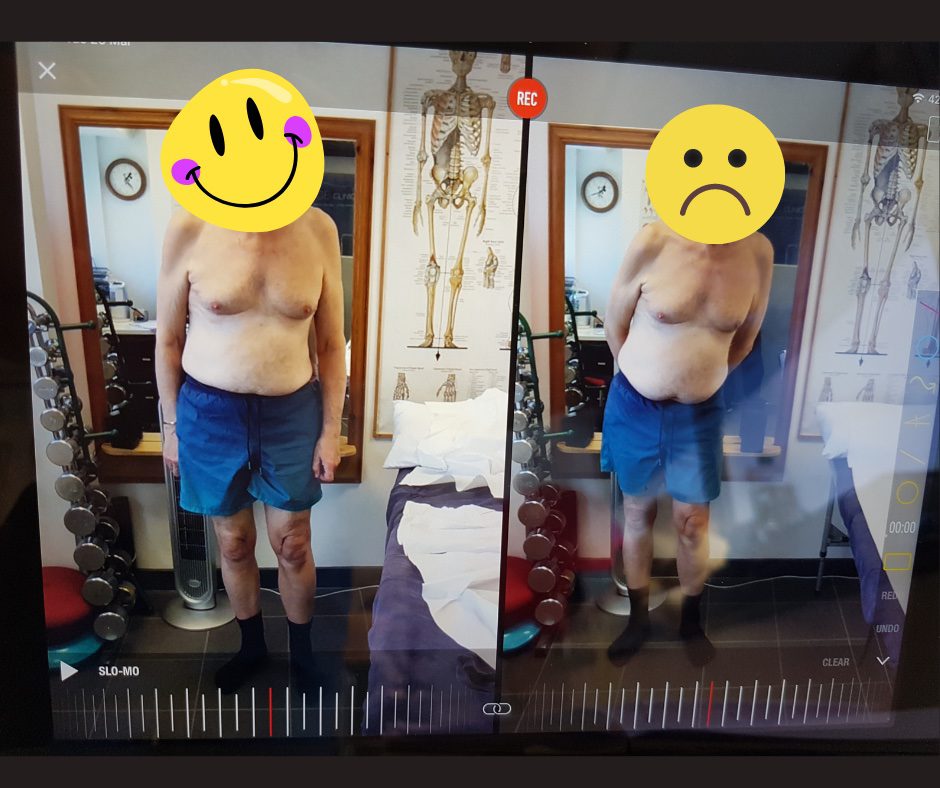Take a look at the photo below. On the right is a picture of client’s before treatment and the one on the left is following treatment.This gentleman has Multiple Sclerosis (M.S.)…but he is excited with his progress and very happy to have this progress shown .

As with our previous articles highlighting how chronic arthritic conditions needn’t be as limiting as we can be lead to believe, we look today at how this client, now in his 70’s has refused and refuses to allow his M.S. to limit him.
Diagnosed as a young man, he ignored the doom and gloom outlook he was given, and decided he would handle the condition by keeping a positive attitude and as he puts it ‘ being bloody minded’. Now, attitude does have an enormous effect on how we deal with a chronic condition, pain and discomfort. Take an example of somebody thinking they are having a heart attack, then the paramedic announces it’s indigestion. That person will instantly feel remarkably better, before any medication even gets near them.
Well, this gentleman’s ‘bloody mindedness’ has got him by for 50 years, but gradually he ended up in the position on the right hand picture. This lead to him to experience trouble with walking and balance, culminating in a number of falls in the last year. This is the point at which we entered the mix. Keen to not spend his later years in this state, he finally accepted he might benefit from some help .
Is this position due to his Multiple Sclerosis
As with all chronic conditions we started by separating the direct effects of his Multiple Sclerosis, from the secondary and tertiary effects. We see a a fair number of people with M.S. here at The Reinge Clinic and his posture was not typical of Multiple Sclerosis. It was more the result of a gradual, bio mechanical compensation for a common effect of M.S, namely weakness in one leg. His balance and fall issues were a result of this adapted body position, taking his centre of gravity too far away from his centre of mass, and his inability to correct this position was due to weak spinal and pelvic stabiliser muscles.
So we have four things here:
- Multiple Sclerosis which directly results in muscle weakness, usually in only one side.
- We then have an adaptive lean of the body.
- A postural based balance issue.
- A weak core.
Well three of those four (the later three) would also occur over time, if somebody had injured one leg and never rehabilitated it, for example. Put another way, they are not to do with the Multiple Sclerosis itself. This is how we make dealing with complex and chronic conditions simpler, we strip away the confusion as to what is the condition and what is not. For this gentleman, this will soon mean he is only dealing with one issue….his Multiple Sclerosis. Not four issues.
So what have we done here?
Well, first we identified which muscles were weak, grouped that information into what order those weaknesses needed to be addressed. He then joined a gym, which we visited with him, and got a personal trainer to supervise, encourage and monitor exactly what exercise we needed him to do. We saw him every two weeks for a few months to temporarily straighten him up (habitual posture and weakness would pull him back, but less so each time). Then on his last visit he went from the posture on the right picture, to the picture on the left with nothing more than a thirty second trigger point into the glute muscle.
He has remained there since, not tripped, not fallen and is walking 100 % better. Now we start the final straighten up, core strengthening and postural work and that will put him into a position where we can all deal with the effects of his Multiple Sclerosis, which we can also help with, without all the unnecessary limitations he originally arrived with.
So, the takeaway message here is don’t let a chronic condition limit you any more than it needs to, and if you are not sure how much of a condition is a secondary result, then call us for a chat.
Find out more about how we approach chronic health conditions here.
See this article looking at positive mindset and the effect on chronic diseases.